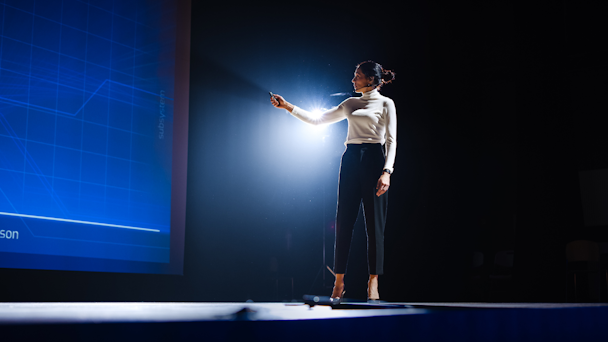To combat death by webinar, B2B hybrid events hit yet another gear
From American Express to Amazon, top brands are increasingly looking to connect with their business customers by exploring new ways to elevate events in the digital realm. This has led to increased investment in proprietary events (versus investing in industry tentpole events), a deeper partnership between the content and events departments as well as increased inspiration from the consumer marketing world. Here’s what you need to know about B2B event marketing today.

Digital presentations are still taking center stage.
Death by webinar has become what every business-to-business (B2B) event marketer is fighting against. Yes, there has been a toe in the water with live events and lots of progress with hybrid events, but creating a compelling, core digital presence is the rule of the day.
That’s why as B2B marketers look to 2022, there has been an indelible shift in how they approach their event investment as well as content creation.
Many are looking at this moment as an inflection point where content and event teams are now aligned to create “content experiences.”
Matt Pensinger, evp, managing director at Jack Morton describes it as “an intersection, a new frontier where the notion of what’s live, virtual, on-demand or other forms of content are coming together in ways that have never been done before. These things were sitting in silos, but now we are seeing smart B2B marketers bringing it together in a more seamless connection.”
Natalia Rybicka, senior director of event marketing at Attentive says, “Content and events have become a true partnership during the pandemic with virtual events dependent on compelling content to draw registrations.”
The shift away from networking being the key, if not primary, focus has altered the very essence of B2B events. “What were once personal, dynamic interactions were reduced to soulless, two-dimensional exchanges,” says Donnalyn Smith, president North America, Momentum Worldwide.
To combat this, Momentum worked with American Express to create Amex Campus, which is a bespoke, fully immersive, web-based, 3D virtual experience platform that has hosted a series of multi-session events. Amex has reached 10,000-plus attendees over five events across three key regions. “Customers had access to invaluable expertise, enriching content, best-in-class speakers and connected with their wider business communities—all from the safety of their own homes,” says Smith.
Then there’s Amazon, who is leveraging augmented reality, via postcards mailed to advertising clients, to pull them into the digital experience. And Facebook who is working to make a festival-like digital experiences for its clients involving in-depth virtual programming and networking. Both are Jack Morton clients.
The advantages of the current, radical shift to hybrid and digital B2B events are many. There is greater reach, less travel expense and the ability to build off a repeatable, digital experience.
These changes have created a “new energy” because all of these developments level the playing field for smaller brands, says Pensinger. “There is a mushroom effect because it’s available to so many more companies.”
At the same time sponsorships of once costly tentpole events have become more reasonable given the general lack of a physical presence. “Virtual events became a lot more economical to sponsor with a content component that was previously very expensive for live events,” says Rybicka.
That’s not say that live events have completely taken a back seat despite Delta variant concerns. Take for example, “Attentive Island.” Attentive, which is a leading text messaging marketing provider, has been bringing live networking events to key markets. “We wanted attendees to feel like they were on vacation since travel has been inaccessible for so long,” says Rybicka. “The event included live music, socially distant experiential elements like a beach bracelet making station, and even a chance to win a staycation via AirBnB.”
No matter, what the channel (live, hybrid or digital), B2B marketers are expected to step it up. This is due in part to the changing demographic of the B2B decision maker. “Many are millennials and their expectations of brand engagement have changed, as they behave more like consumers every day,” says Smith. “They expect the same quality experience with Microsoft as they do from Nike.”
Rybicka agrees. “B2B buyers, just like B2C buyers, have come to expect more from the brands they support. Event marketing, unlike most marketing channels, is a channel that allows you to build brand loyalty with customers in unique, personal and engaging ways. The mindset needs to shift from just selling and leads, to a truly personalized and thoughtful experience that allows you to then build on that relationship to generate a sale.”

